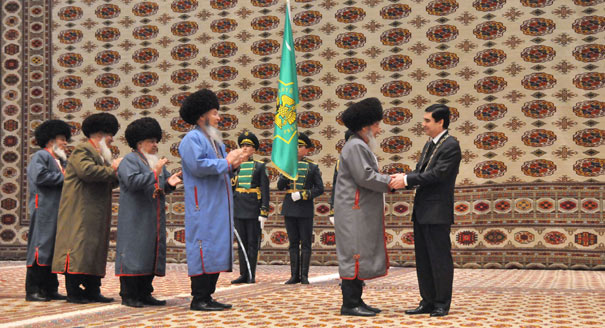Russian President Vladimir Putin has accepted an invitation to visit Turkmenistan, which may lead to a new thaw in the difficult relations between the two countries.
The invitation was extended to Russian Foreign Minister Sergey Lavrov, who visited Ashgabat in late January as the two countries rowed again over gas politics, after Russia’s state-owned gas company Gazprom stopped buying gas from Turkmengaz, the Turkmen state gas company.
Why the attempt at a rapprochement now?
Gas is certainly part of the answer. Turkmenistan was the Soviet Union’s major natural gas repository, accounting for 30 percent of all Soviet gas exports. Soviet Turkmenistan produced about 90 billion cubic meters of natural gas per year, more than independent Turkmenistan ever has, even in its peak production years. Nonetheless, Turkmenistan has remained a key energy provider for Russia since the breakup of the Soviet Union.
But Russia’s purchase of Turkmen natural gas has also long been linked to the status of ethnic Russians in Turkmenistan. In 2003, the two countries signed an agreement allowing Gazprom to buy almost all of Turkmenistan’s gas for 25 years. In the same year, the two countries annulled a 1993 agreement allowing ethnic Russians in Turkmenistan to hold Russian citizenship. The agreements were subsequently dubbed “gas for people.” Discussions on the status of ethnic Russians continued until Ashgabat adopted a new constitution in 2008 that included a prohibition on dual citizenship.
The success of future negotiations will depend on Turkmenistan’s flexibility on gas prices, as well as its willingness to consider Russian interests with regard to gas export routes and construction of pipelines.
The long-running dispute over the legal status of the Caspian Sea has also been a central issue in Russo-Turkmen relations over the past two decades. Indeed, Lavrov’s visit to Ashgabat was timed to coincide with a meeting of a working group comprised of representatives from the five Caspian Sea states (Iran, Azerbaijan, Kazakhstan, Turkmenistan, and Russia).
Although the delimitation of the Caspian Sea remains unresolved, the bottom of the northern part of the sea, where hydrocarbon deposits are concentrated, has long been divided between Azerbaijan, Russia, and Kazakhstan. It’s believed that Iran’s demand for a “just” partition of the sea into five equal sectors is the main obstacle to delimitation, since it does not suit the four other states. At the same time, it’s also understood that a lack of compromise on this issue benefits Russia: as long as the sea belongs to everyone, nothing restricts vessel movement there, including military ships.
The Russian military flotilla is the most powerful military structure in the region. Twenty-six Kalibr cruise missiles were launched from ships in the flotilla against targets in Syria last October. At the time of the launch, the Russian vessels were deployed in the southeastern part of the Caspian, which would belong to Azerbaijan if the sea were delimited.
Turkmen President Gurbanguly Berdimuhamedov relayed his worries about the missile launches to President Putin at the Tehran summit in late November. Interestingly, Berdimuhamedov voiced his concerns on behalf of his “Kazakh friends,” who are worried about the “flights over the Caspian.” Putin did not show much sympathy. He promised to discuss the issue directly with Berdimuhamedov’s “Kazakh friends” and said that Russia will do whatever it needs to protect its security interests.
Another issue in Russian-Turkmen relations is Moscow’s apprehension about the security situation on the Turkmen-Afghan border. Moscow has publically offered Ashgabat military aid to deter various threats emanating from Afghanistan. Last year, Alexander Sternik, the director of the Foreign Ministry’s CIS department, argued that the 750-kilometer-long Turkmen-Afghan border is “essentially a shared southern frontier…. Given the far from stable conditions in Afghanistan and the fragmentation of armed opposition forces, it is extremely difficult for a frontline state to build its security model unilaterally.”
Gas was also on the agenda at Lavrov’s talks in Ashgabat. Due to an escalating conflict between Gazprom and Turkmengaz, the Russian gas giant stopped purchasing Turkmen gas last month, thereby depriving Turkmenistan of an important source of hard cash. China, whose gas purchases account for the lion’s share of Turkmen exports, receives the gas as a repayment of Turkmenistan’s multibillion-dollar debt, while Iran pays for Turkmen gas with goods and services that Turkmenistan must import.
Lavrov’s visit and the Turkmen government’s decision to invite Putin to visit Ashgabat suggest that the two sides may be willing to compromise on gas prices, as it is not in either country’s interest to let the price dispute drag on for too long.
At the same time, Russia is still trying to prevent the construction of the Trans-Caspian pipeline, which would ship Turkmen and Azerbaijani gas to Turkey. Azerbaijan’s interests on this issue coincide with Russia’s. Thus far, it has opposed the construction of the pipeline but is facing steady pressure from Turkey to change its position.
It is surely no coincidence that just before Lavrov arrived in Ashgabat, Turkmenistan unveiled a new military doctrine, which reaffirms that Turkmenistan’s efforts to strengthen its defenses are consistent with its permanent status as a neutral country.
The Turkmen leadership remembers well how Russia justified its military campaign in South Ossetia in 2008 by saying that it needed to protect Russian citizens. Ashgabat concluded that Russia might take similar steps to protect ethnic Russians in Turkmenistan, which is why in 2012 Turkmen military forces conducted a military training exercise near the eastern shore of the Caspian Sea.
Ashgabat was no less worried about the annexation of Crimea. The dramatic deterioration of Russian-Turkish relations has further clouded Turkmen-Russian relations. Turkmenistan has strong ties with both sides and hosted Turkish President Recep Tayyip Erdoğan in Ashgabat just a few days after the Russian jet was shot down last December. Every time Russia and Turkmenistan work on resolving one issue, another one appears over the horizon.
